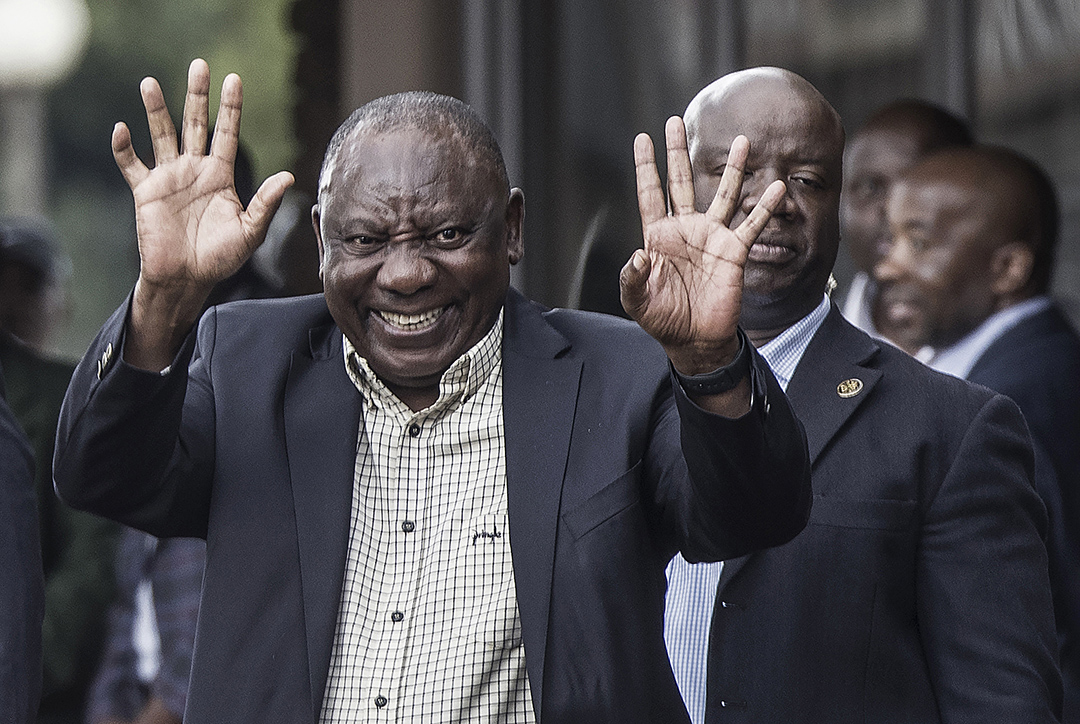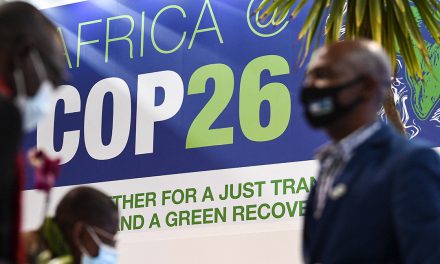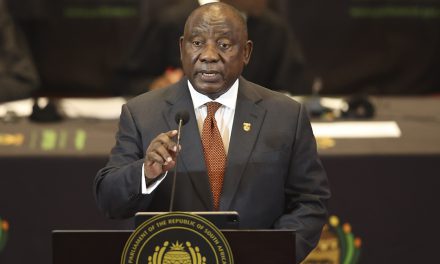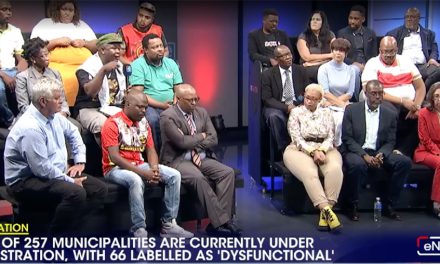The Section 89 Independent Panel has found that there is prima facie evidence that there may be grounds for the removal of President Cyril Ramaphosa. Yet the President has vehemently denied any wrongdoing. This leads one to question on what grounds it is possible for Ramaphosa to legally challenge the findings of this panel. This is all new territory for South Africa’s constitutional democracy. It is the first time the new three-stage impeachment rules are being used.

South African President Cyril Ramaphosa waves outside the NASREC Centre in Johannesburg on 5 December 2022, after the National Executive Committee (NEC) of the ANC met to discuss his fate following the Section 89 Independent Panel findings. Photo: Marco Longari/AFP
The three stages can be laid out as follows. Stage one: After a motion for removal of the President is submitted in Parliament, the Speaker refers it to the independent panel for a preliminary inquiry into whether there is sufficient evidence of grounds for removal of the President. Stage two: After consideration of the report, the National Assembly either resolves not to proceed with the Section 89 inquiry, or resolves to proceed and refers the matter to an ad hoc Impeachment Committee to undertake a full-scale investigation into whether the President is in fact guilty of an impeachable offence. Stage three: If the impeachment committee recommends the removal of the President, this must be debated and voted on in the National Assembly. A two-thirds majority is needed to remove the President from office.
It is not possible for Ramaphosa to appeal the substantive contents or merits of this decision. Exercises of power by the legislative and executive branches of the government are not appealable by the judicial branch, since the separation of powers principle dictates that courts may not usurp the role of these decision-makers. So it would only be possible for Ramaphosa to legally review the way in which the decision was reached. This can be done in terms of the principle of legality (lawfulness, rationality and reasons), or if the decision can be said to constitute administrative action, it could be reviewed in terms of the Promotion of Administrative Justice Act (PAJA) 3 of 2000 (lawfulness, procedural fairness, and reasonableness).
It is a significant legal question whether the panel’s decision that there is sufficient evidence of grounds for removal constitutes administrative action, since the requirements of PAJA are more demanding than those of the principle of legality, and could possibly affect the freedom and independent functioning of the panel. Expanding the grounds of reviewability of the Section 89 panel’s decisions could also impact the credibility of the investigation.
Are the findings of the panel administrative action?
An administrative decision can be defined as one of an administrative nature (i.e. not judicial, legislative or executive) by an organ of state or a natural or juristic person, exercising a public power or performing a public function, in terms of legislation or an empowering provision, that adversely affects rights and has a direct external legal effect.
The Section 89 panel is specifically independent of Parliament, and is made up of a retired Chief Justice, a retired judge of the High Court, and a Senior Counsel Advocate. Thus, it cannot be said to be a decision of a legislative “law-making” nature, and neither is it of a judicial nature, as its powers are considerably different from a court of law. Thus, the panel’s findings seem to fall within the ambit of an administrative decision.
Yet, there is reason to believe that the direct external legal effect of the panel’s findings is in doubt. Case law suggests that investigatory processes not including the making of binding decisions do not ordinarily amount to administrative action, since they cannot be said to have a direct external legal effect on those implicated.[1]
The panel’s findings are not in themselves a final and binding decision on whether Ramaphosa will be impeached, and in no way obliges the National Assembly to impeach him. Rather, Ramaphosa’s fate depends on what the National Assembly decides to do with this information – a decision which is purely legislative and not reviewable in terms of PAJA. Thus, there is perhaps an argument that the findings are too preliminary to have a direct external legal effect. This was an argument I advanced in a previous article in relation to the non-binding nature of the findings against Gwede Mantashe in the State Capture Commission of Inquiry.
However, there may well be grounds for thinking that the findings of the Section 89 panel could perhaps be considered as a more conclusive determination of wrongdoing, such that they have a direct external legal effect. In Viking Pony Africa, the Constitutional Court argued that “It is unlikely that a decision to investigate … which excludes a determination of culpability, could itself adversely affect the rights of any person, in a manner that has a direct and external legal effect”. That case concerned a decision by an organ of the state on the mere “reasonable possibility“ of fraudulent misrepresentation of facts. Yet, the National Assembly Rules for the Section 89 panel inquiry require that the panel determine whether there is a higher threshold “sufficient evidence” of an impeachable offence. This even seems to set a subtly higher standard than “prima facie” (face value) evidence. Yet, the panel did not seem to take this different wording into account, focusing on finding prima facie evidence. In fact, this could bring the lawfulness of the panel’s report into question – since the panel could be considered to have exceeded its mandate by making findings on the wrong standard of evidence.
Despite this higher evidence standard required of the panel, only the parliamentary ad hoc committee (stage two of the three-stage process) can determine whether the President is actually ‘guilty’ of a serious violation or serious misconduct. Only the committee is empowered to investigate the matter fully, including summoning persons to give evidence before it or to produce documents and hold public hearings.[2] This would suggest that the independent panel’s findings are perhaps too preliminary to have a direct and external legal effect, as stated in Viking Pony.
Yet, Richard Calland argued that the panel’s preliminary assessment was in fact elevated to making very serious findings against the President, albeit on the basis of “limited, untested and largely hearsay, evidence”. Would this suggest that the findings, which did ultimately seem to make a far more determinative decision of wrongdoing (even though it possibly shouldn’t have at that stage and with the available information), could be considered to have a direct and external legal effect? It is possible, especially since the decision involves findings of the gravest nature against the President, which would ultimately have a significant impact on the country as a whole. If this is the case, the decision could constitute administrative action reviewable in terms of PAJA.
If the panel’s findings are reviewable in terms of PAJA, the President could challenge the reasonableness of the findings. This sets a higher standard than the principle of legality’s rationality review. Rationality sets a very low bar – it merely requires a rational connection between the exercise of power (the panel’s decision) and its purpose (to determine if there is sufficient evidence of an impeachable offence). However, reasonableness goes further. A reasonable decision is one which is not only rational but also proportional. This means the decision must be necessary, appropriate, and not needlessly onerous. If there is a less ‘oppressive’ decision, that could be required.[3] A challenge based on reasonableness would make it easier for the President to contest the actual findings of the panel.
Whether the report’s findings are challenged on the basis of rationality or the more demanding reasonableness, the focus would be on the many holes (the “known unknowns”) and “leaps of logic” in the panel’s report, as noted by several legal professionals.[4]
Legal standing of the panel’s findings
The first stage of the three-step impeachment process is to objectively establish whether there is sufficient evidence of grounds for impeachment. This is to prevent spurious and baseless impeachment proceedings against Presidents, which would evidently be harmful to the legitimacy of the constitutional democracy.
However, what would the case be if the panel found that there was sufficient evidence of a serious violation of the Constitution or the law, or serious misconduct, and the National Assembly, in stage two, opted not to proceed to set up an impeachment committee? This hypothetical question is offered for the sake of thinking about a case in which the panel’s findings were of the required quality and credibility, and would undoubtedly stand up to any form of judicial review.
Referring to stage two of the process, the National Assembly Rules simply state that “In the event the Assembly resolves that a Section 89(1) inquiry be proceeded with, the matter must be referred to the Impeachment Committee established by this rule for that purpose”. There is no mention of any obligation on the Assembly to proceed with establishing a committee if there is sufficient evidence of an impeachable ground.
It seems to me that it would be problematic for there to exist not only prima facie, but the apparently higher threshold of sufficient evidence of a serious breach of the Constitution or serious misconduct, and Parliament resolves not to proceed with setting up an impeachment committee. What weight would the panel’s findings hold in such a case? If the National Assembly could simply decide not to establish the ad hoc committee to fully investigate after findings of serious violations of the Constitution or the law, or serious misconduct, then what would the point of the independent inquiry be? How would the situation be different from before the panel carried out its investigation?
It is unclear whether requiring the National Assembly to set up an impeachment committee if the panel finds sufficient evidence of grounds for impeachment would constitute a delegation of Parliament’s powers to another body, since it is still the ad hoc committee of the National Assembly tasked with deciding the actual merits of the matter anyway. Only the committee can decide as a matter of finality whether the President is, in fact, impeachable. This would not be an administratively reviewable decision, as this is a decision made by an elected deliberative legislative body, and so is legislative in nature.
A Section 89 impeachment process, unlike a Section 102 motion of no confidence, is not a purely political procedure. In the impeachment process, facts are more vital. This was confirmed by Justice Jafta in the Constitutional Court case of EFF v Speaker of the National Assembly. Failing to proceed with establishing an impeachment committee thus possibly disregards sufficient evidence of grave allegations against the President – a serious violation of the Constitution or the law, or serious misconduct – which would undermine the legitimacy and intentionally evidence-based nature of the impeachment process.
The way forward
The politics of the moment – an upcoming ANC elective conference and the technicalities of the party’s own step-aside rule, not to mention the questionable genesis of the complaint against the President – should not detract from the important governance questions at stake. Judicial review of the panel’s findings may be warranted – the lawfulness, rationality and reasonableness of the report are in question. If reviewable in terms of PAJA, it is more likely that the report’s findings will be more closely scrutinised by a court. In this case, it is vital that the difference between the impeachment rules’ requirement of “sufficient” evidence and the panel’s use of “prima facie” evidence be clarified. It is also important to consider the authentic function and legal standing of the preliminary inquiry if Parliament resolves not to proceed with setting up a committee to launch a full investigation into the matter. Otherwise, it is not obvious how the impeachment process is any more evidence-based and fact-centric than a motion of no confidence.
From a governance perspective, we need a process that ensures justice, respects its legal mandate, upholds the separation of powers, and ultimately strengthens the functioning of our constitutional democracy. What unfolds in the coming weeks will hopefully bring us closer to this goal.
[1] Simelane NO v Seven-Eleven Corporation SA (Pty) Ltd 2003 (3) SA 64 (SCA) para 17; Competition Commission of SA v Telkom SA Ltd [2010] 2 All SA 433 (SCA) para 11; Gamede v Public Protector 2019 (1) SA 491 (GP).
[2] As mentioned in the Section 89 Independent Panel report para 70 and 75.
[3] Ehrlich v Minister of Correctional Services 2009 (2) SA 373 (E) para 42.
[4] https://www.dailymaverick.co.za/article/2022-12-01-ramaphosa-should-jump-at-the-chance-to-clear-his-name-before-an-impeachment-inquiry-if-he-has-nothing-to-hide/ ; https://www.dailymaverick.co.za/article/2022-12-02-in-the-eye-of-the-storm-inside-the-report-that-might-sink-cyril-ramaphosa/ ; https://www.news24.com/citypress/voices/modidima-mannya-why-the-section-28-panel-report-is-flawed-20221203
Helen Acton is a legal analyst at GGA. She holds a Bachelor’s degree in Politics and Philosophy, and an LLB from the University of Cape Town. She is interested in analysing political issues from a legal perspective. Constitutional and administrative law are her primary interests, especially the role they can play in promoting socio-economic equality and improving governance performance.












